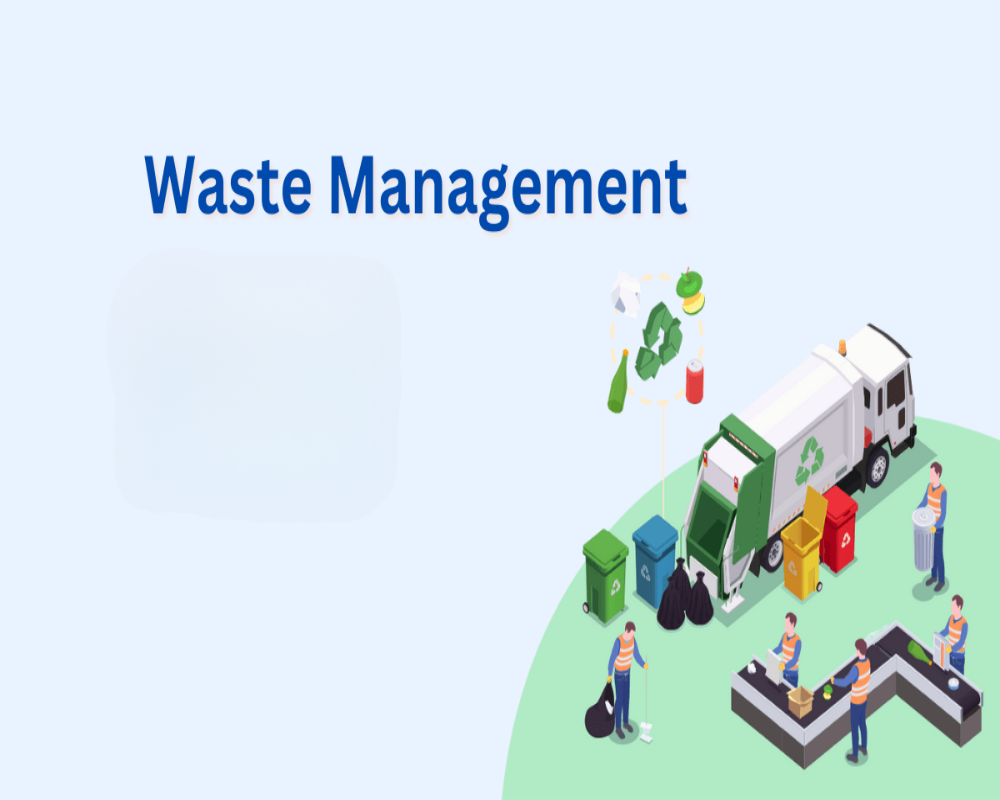Waste Management in Industrial Zones
Introduction
Waste management in industrial zones is a critical aspect of sustainable development and environmental protection. As industrial activities generate a wide range of wastes—including solid, liquid, and hazardous materials—effective management systems are essential to ensure that waste is handled, treated, and disposed of in a way that minimizes harm to the environment and human health. In organized industrial zones, where multiple manufacturing, processing, and service units operate in close proximity, waste management must be coordinated, regulated, and monitored to maintain cleanliness, compliance, and ecological balance.
Industrial waste varies greatly in composition and volume depending on the type of industry. It may include process residues, chemical sludges, packaging materials, metals, plastics, oils, dyes, solvents, and biological waste. Poor waste management in such settings can lead to air and water pollution, soil contamination, health risks, and regulatory penalties. Therefore, industrial zones are often subject to specific rules, infrastructure requirements, and monitoring frameworks to ensure responsible waste handling and disposal.
Segregation and Source Management
A fundamental component of waste management in industrial zones is proper segregation at the point of generation. Industries are expected to separate waste into categories such as recyclable, biodegradable, non-hazardous, and hazardous waste. This practice improves the efficiency of treatment and disposal while enabling the reuse and recycling of valuable materials. Clear labeling, designated collection areas, and regular training of personnel are essential to maintain an effective segregation system.
Each industrial unit is responsible for managing its internal waste streams in accordance with applicable laws and best practices. This includes maintaining waste logs, tracking quantities generated, and identifying opportunities to reduce, reuse, or recycle materials. In many industrial parks, a common waste collection system is established to coordinate waste movement from individual units to centralized processing facilities.
Infrastructure and Common Facilities
Well-planned industrial zones often include shared infrastructure for waste treatment and disposal. This may consist of a common hazardous waste storage area, effluent treatment plants, composting units, and material recovery facilities. These centralized facilities ensure that waste is treated in compliance with environmental standards and reduce the need for each unit to develop its own treatment infrastructure.
Effluent treatment plants handle liquid waste from multiple sources, ensuring that water discharged into public drains or natural bodies meets environmental norms. Similarly, common incineration or secured landfill facilities may be designated for hazardous and non-recyclable waste, managed under regulatory oversight to prevent pollution.
The success of such facilities depends on systematic scheduling, standardized procedures, and active coordination between zone authorities and industrial units. Regulatory bodies may require periodic audits and data reporting to confirm that waste is being processed as intended.
Compliance and Regulatory Framework
Industrial waste management is governed by national and state-level environmental laws, including hazardous waste management rules, plastic waste rules, biomedical waste rules, and e-waste rules, among others. Industries operating in industrial zones are required to obtain authorization for waste handling, maintain documentation, and ensure that waste is transported and disposed of by authorized handlers.
Monitoring systems and reporting requirements are enforced to track compliance. Industries are expected to submit annual waste management reports, provide details on waste minimization efforts, and disclose any incidents of accidental release or improper disposal. Non-compliance may result in fines, suspension of operations, or legal proceedings.
Zone authorities often facilitate compliance by organizing awareness programs, providing regulatory updates, and assisting units with technical support in waste treatment and disposal. Joint inspections by environmental regulators and industrial park management are common to maintain high compliance standards.
Sustainability and Resource Recovery
Beyond compliance, many industrial zones are adopting sustainability-focused waste management strategies that aim to transform waste into a resource. This includes the promotion of circular economy practices, where waste from one industry becomes a raw material for another, and investments in technologies for waste-to-energy, bio-remediation, and industrial symbiosis.
Recyclable waste such as metals, paper, and certain plastics is increasingly being recovered and reintroduced into the production cycle, reducing the demand for virgin materials. Organic waste from food processing or agricultural units is often diverted to composting or bio-gas units to produce energy or fertilizers.
Public-private partnerships are also emerging to develop integrated waste management systems that combine innovation, efficiency, and economic value. These approaches not only reduce the environmental burden of industrial zones but also create business opportunities and jobs in the waste management sector.
Conclusion
Waste management in industrial zones is a multifaceted process that requires careful planning, strict regulation, shared infrastructure, and proactive engagement by all stakeholders. It is no longer just a matter of disposal but a strategic function that contributes to environmental sustainability, operational efficiency, and regulatory compliance. As industrial activity continues to grow, the importance of robust and intelligent waste management systems will only increase, shaping the future of clean, efficient, and responsible industrial development.
Hashtags
#WasteManagement #IndustrialZones #SustainableIndustry #EcoFriendly #WasteReduction #Recycling #CircularEconomy #PollutionControl #GreenManufacturing #WasteDisposal #EnvironmentalImpact #SustainablePractices #IndustrialWaste #ResourceEfficiency #CleanIndustry #WasteMinimization #WasteTreatment #EcoInnovation #ResponsibleManufacturing #ZeroWaste


